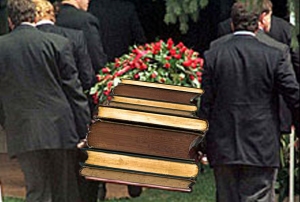A year or so ago I was at a literature event celebrating the Granta Best Young Novelists. I asked the panel to name an author whom they thought also belonged in the anthology, but hadn’t been selected. Two of the panelists were more than happy to name people, but one of them, Adam Foulds, didn’t. Instead, he claimed that he didn’t bother reading modern fiction, that there really, was no point to it.
Will Self said something similar in a piece for The Guardian earlier this year. It has been bastardised and misquoted all over the place, but one section in particular stood out for me.
“The saying is that there are no second acts in American lives; the novel, I think, has led a very American sort of life: swaggering, confident, brash even – and ever aware of its world-conquering manifest destiny. But unlike Ernest Hemingway or F Scott Fitzgerald, the novel has also had a second life. The form should have been laid to rest at about the time of Finnegans Wake, but in fact it has continued to stalk the corridors of our minds for a further three-quarters of a century. Many fine novels have been written during this period, but I would contend that these were, taking the long view, zombie novels, instances of an undead art form that yet wouldn’t lie down.”

Image originally posted http://www.frazeology.com/death-novel/
I have managed to get a lot of reading done this year, more so than most other years. Probably thanks to a longer commute, and reviewing demands amongst other things. Looking back at my reading list for the year – you can find it here on my website – I’ve noticed that I have been well and truly embedded in the second life of the novel. The oldest books I’ve read (The Gunslinger, ‘salem’s lot and The Drowned World) date back merely to the 60’s and 70’s. The newest books – some of them haven’t even been published yet.
Now, I don’t buy the essential argument of Foulds that modern literature is pointless. I don’t even really believe that we’re in the death throes of literature, as Self suggests. But, what has concerned me is that I might be missing out on some cracking pre-war literature.
So – I’d like suggestions please. What books, pre-1945 should I have read? There’s a lot of classics that I’ve trawled through over the years, but there’s a great many undiscovered gems out there that I bet will be new to me.
Recommend away!
All Quiet on the Western Front by Erich Maria Remarque
I am always a little suspicious of novelists that claim not to read modern stuff. They seem to be trying too hard, saying both ‘I only read Hemmingway and Henry James, therefore my work is a reaction to the classics and thus more important than anyone else’ which is nonsense, but more importantly they are saying ‘I haven’t read anything written since 1960, so CLEARLY you can’t compare my work with anything else because I came to my ideas COMPLETELY INDEPENDENTLY of the development of literature and I am OBVIOUSLY A GENIUS.’
Anyway, rant aside, pre war literature…
1930s… The Madman of Bergerac by Georges Simenon – in which Maigret is confined to his bed and has to solve a murder with the help of Mme Maigret.
1920s… A Country Doctor’s Notebook by Mikhail Bulgakov
1850-1900… Three Men in a Boat by Jerome K Jerome, King Solomon’s Mines by H. Rider Haggard, Dr Jekyll and Mr Hyde by Robert Louis Stevenson – all still very fresh, and The Confidence-Man by Herman Melville, which is hard work but has some lovely stuff in it – “The miser, a lean old man, whose flesh seemed salted cod-fish, dry as combustibles; head, like one whittled by an idiot out of a knot…”
Short stories – Maupassant and Kipling are great, except when Kipling does soldier’s accents, avoid those.
Earlier? Nathaniel Hawthorne is the golden light of the first half of the 18th century. Wuthering Heights is obviously brilliant.
Earlier? All writers should read all Shakespeare, Boccaccio’s Decameron and at least some of the 1001 nights. Ariosto’s Orlando Furioso is a blast. Danté is fun. As is Marlowe and some Milton (Samson Agonistes for my money is his best, though I accept I am in the minority here) I have a soft spot for all those blood feuds in the Icelandic Sagas too.
Earlier? Xenophon’s Persian Expedition is more fun than you might imagine, as is Plato (if you avoid The Republic, which is terrible) Sophocles, Euripides, Aeschylus, Homer, Ovid…
mmmmm books